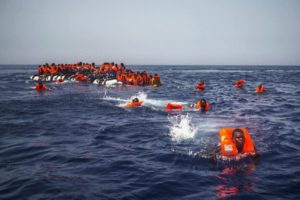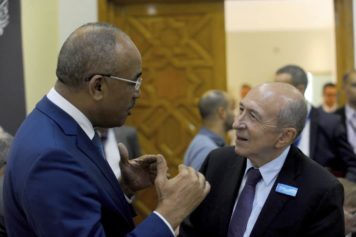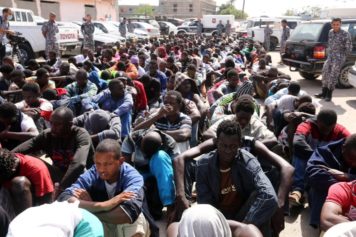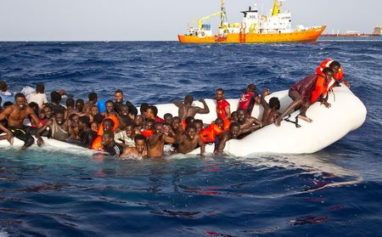
FILE – African migrants try to reach a rescue boat from the Spanish aid organization Proactiva Open Arms, after falling from a punctured rubber boat in the Mediterranean Sea, about 12 miles north of Sabratha, Libya, on July 23, 2017. (AP Photo/Santi Palacios)
PARIS (AP) — The first group of African refugees benefiting from a new initiative bringing those deemed to be especially vulnerable directly to Europe arrived in France on Monday.
The 19 Sudanese, including 11 children, were selected from a camp in Chad, where hundreds of thousands escaping war have taken refuge. They headed by bus to a convent in Alsace in eastern France after their arrival, where they will stay for four months before being moved to lodgings, according to an Interior Ministry official.
The official, who wasn’t authorized to speak publicly and requested anonymity, said a second group of 25 refugees pre-selected in Niger will arrive Tuesday followed by another group Wednesday. More are due to follow.
France committed to welcoming 3,000 migrants from Niger and Chad within two years as part of an initiative, also involving Germany, Italy and Spain. France plans to re-settle 7,000 others coming from points in the Middle East.
The initiative establishes “protection missions” in Chad and Niger, two West African countries through which migrants often pass and where migrants can be selected for asylum in Europe. The International Organization for Migration, a United Nations body, cooperates in the task.
The process allows migrants to immigrate legally in Europe if their names are on an eligibility list provided by the U.N. refugee agency and registered with authorities in Niger and Chad.
The new program marks a change from previous approaches, bypassing the standard practice for asylum bids. Currently, those seeking refuge in Europe must apply in the country of arrival, overloading nations like Italy and Greece.
The initiative critically also implies a pre-selection that by definition passes over potential economic migrants, something that French President Emmanuel Macron is keen on cracking down on. A new law is planned for next year.
Meanwhile, the French government said it expelled 14 percent more migrants in the first 11 months of this year than it did last year.
Interior Minister Gerard Collomb said on RTL radio that the tougher policy “is the line of all French.”


